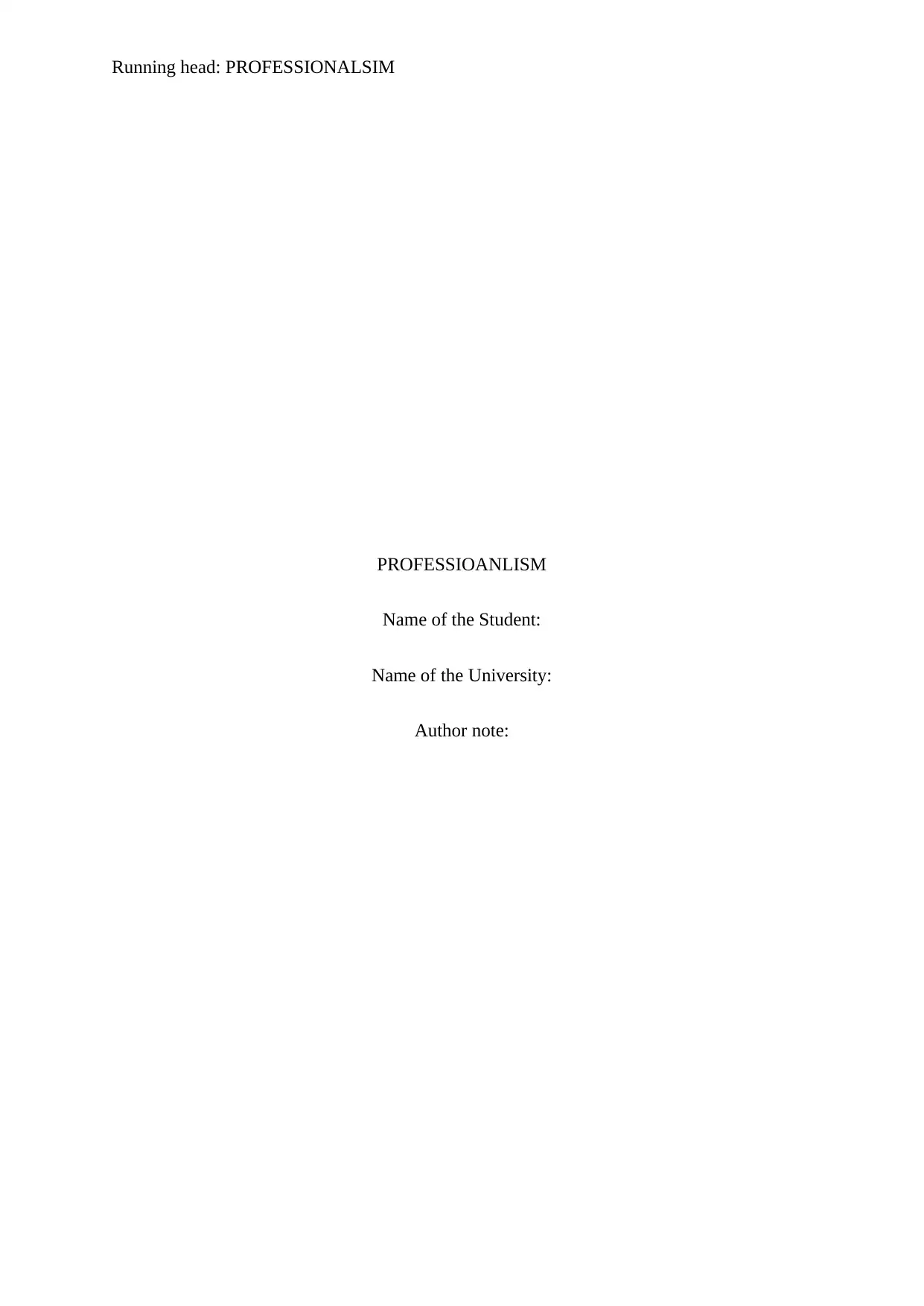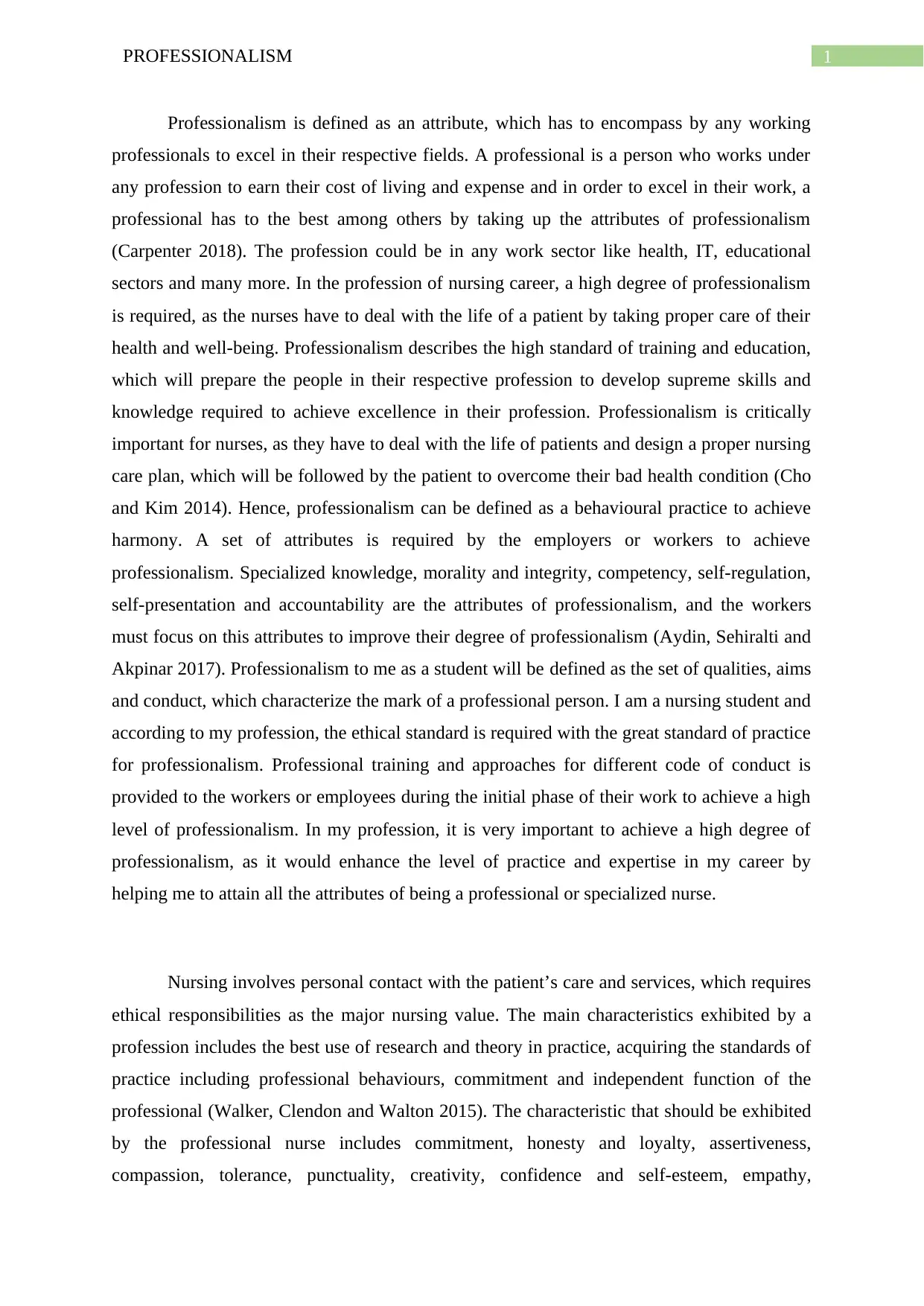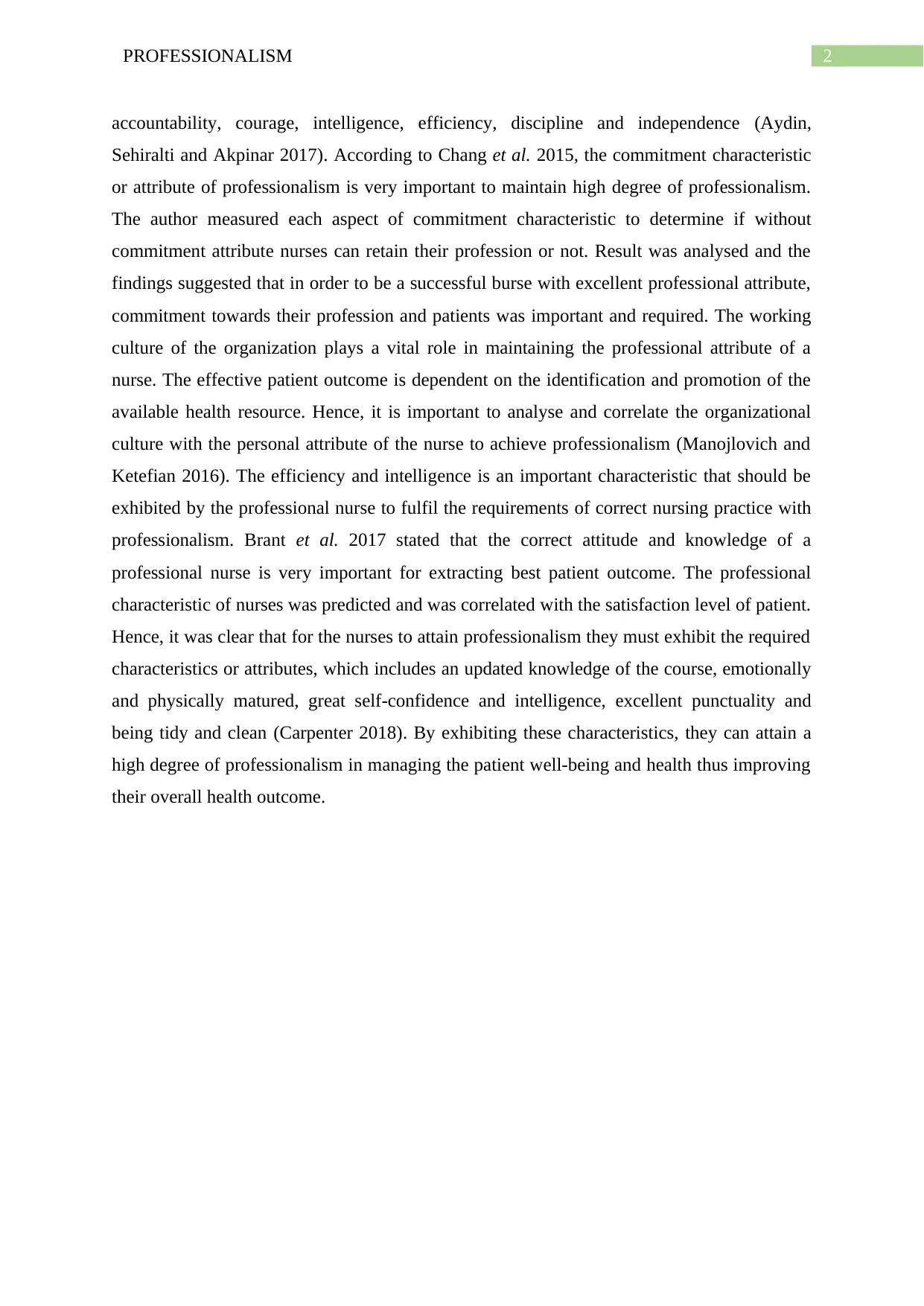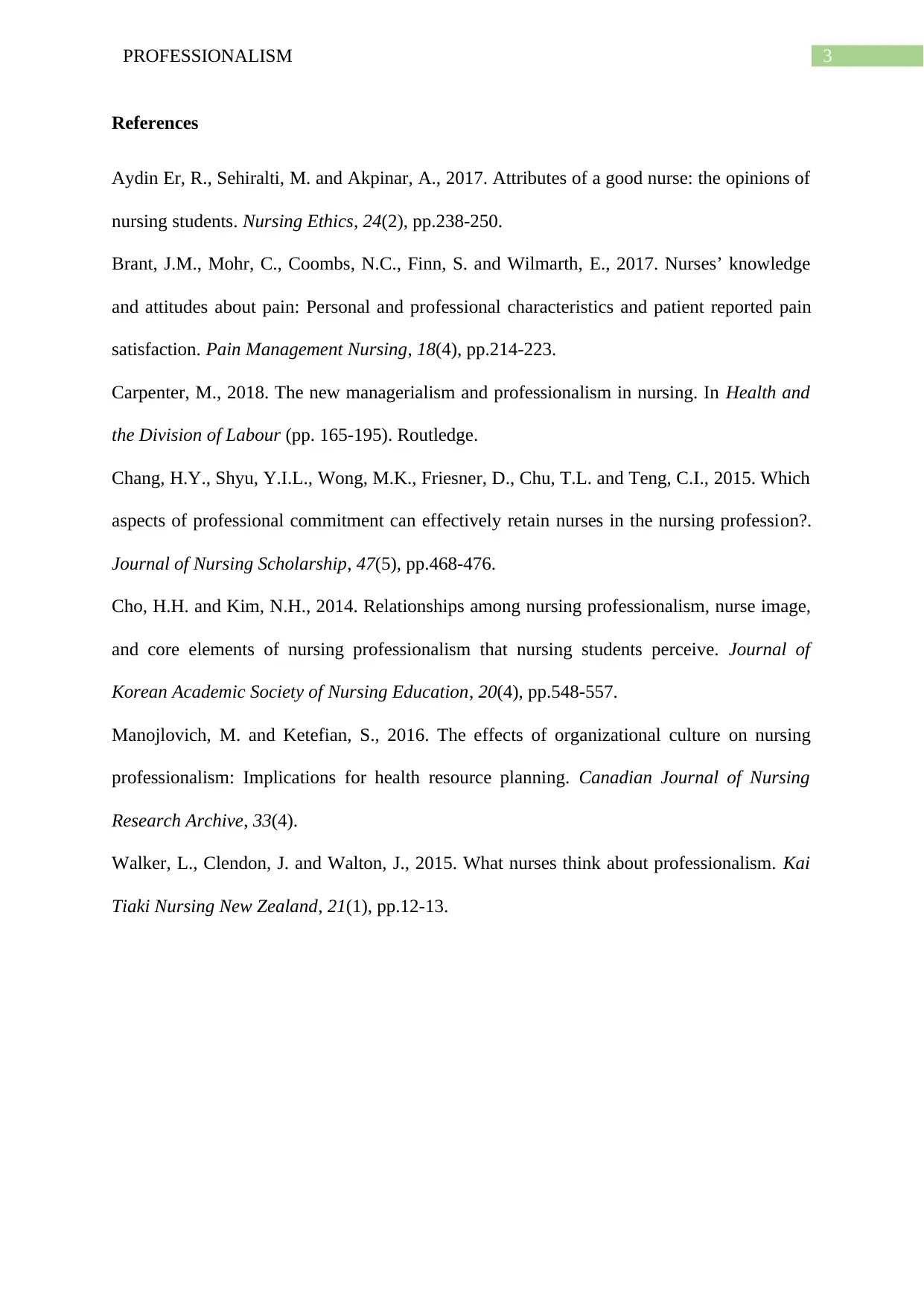Importance of Professionalism in Nursing: An Analysis
VerifiedAdded on 2023/04/08
|4
|928
|277
Essay
AI Summary
This essay delves into the multifaceted concept of professionalism within the nursing profession. It defines professionalism as a critical attribute for success, emphasizing the high standards of training, education, and ethical practice required in healthcare. The essay highlights the importance of professionalism in nursing, particularly in patient care and the development of comprehensive nursing care plans. It identifies key attributes of professionalism, including specialized knowledge, morality, integrity, competence, self-regulation, self-presentation, and accountability. The essay also explores the characteristics exhibited by professional nurses, such as commitment, honesty, loyalty, compassion, and empathy. It references several studies to support the impact of these attributes on patient outcomes and the overall working culture within healthcare organizations. The essay concludes by emphasizing the significance of nurses exhibiting required characteristics like updated knowledge, emotional maturity, self-confidence, and punctuality to achieve a high degree of professionalism and improve patient well-being.

Running head: PROFESSIONALSIM
PROFESSIOANLISM
Name of the Student:
Name of the University:
Author note:
PROFESSIOANLISM
Name of the Student:
Name of the University:
Author note:
Paraphrase This Document
Need a fresh take? Get an instant paraphrase of this document with our AI Paraphraser

1PROFESSIONALISM
Professionalism is defined as an attribute, which has to encompass by any working
professionals to excel in their respective fields. A professional is a person who works under
any profession to earn their cost of living and expense and in order to excel in their work, a
professional has to the best among others by taking up the attributes of professionalism
(Carpenter 2018). The profession could be in any work sector like health, IT, educational
sectors and many more. In the profession of nursing career, a high degree of professionalism
is required, as the nurses have to deal with the life of a patient by taking proper care of their
health and well-being. Professionalism describes the high standard of training and education,
which will prepare the people in their respective profession to develop supreme skills and
knowledge required to achieve excellence in their profession. Professionalism is critically
important for nurses, as they have to deal with the life of patients and design a proper nursing
care plan, which will be followed by the patient to overcome their bad health condition (Cho
and Kim 2014). Hence, professionalism can be defined as a behavioural practice to achieve
harmony. A set of attributes is required by the employers or workers to achieve
professionalism. Specialized knowledge, morality and integrity, competency, self-regulation,
self-presentation and accountability are the attributes of professionalism, and the workers
must focus on this attributes to improve their degree of professionalism (Aydin, Sehiralti and
Akpinar 2017). Professionalism to me as a student will be defined as the set of qualities, aims
and conduct, which characterize the mark of a professional person. I am a nursing student and
according to my profession, the ethical standard is required with the great standard of practice
for professionalism. Professional training and approaches for different code of conduct is
provided to the workers or employees during the initial phase of their work to achieve a high
level of professionalism. In my profession, it is very important to achieve a high degree of
professionalism, as it would enhance the level of practice and expertise in my career by
helping me to attain all the attributes of being a professional or specialized nurse.
Nursing involves personal contact with the patient’s care and services, which requires
ethical responsibilities as the major nursing value. The main characteristics exhibited by a
profession includes the best use of research and theory in practice, acquiring the standards of
practice including professional behaviours, commitment and independent function of the
professional (Walker, Clendon and Walton 2015). The characteristic that should be exhibited
by the professional nurse includes commitment, honesty and loyalty, assertiveness,
compassion, tolerance, punctuality, creativity, confidence and self-esteem, empathy,
Professionalism is defined as an attribute, which has to encompass by any working
professionals to excel in their respective fields. A professional is a person who works under
any profession to earn their cost of living and expense and in order to excel in their work, a
professional has to the best among others by taking up the attributes of professionalism
(Carpenter 2018). The profession could be in any work sector like health, IT, educational
sectors and many more. In the profession of nursing career, a high degree of professionalism
is required, as the nurses have to deal with the life of a patient by taking proper care of their
health and well-being. Professionalism describes the high standard of training and education,
which will prepare the people in their respective profession to develop supreme skills and
knowledge required to achieve excellence in their profession. Professionalism is critically
important for nurses, as they have to deal with the life of patients and design a proper nursing
care plan, which will be followed by the patient to overcome their bad health condition (Cho
and Kim 2014). Hence, professionalism can be defined as a behavioural practice to achieve
harmony. A set of attributes is required by the employers or workers to achieve
professionalism. Specialized knowledge, morality and integrity, competency, self-regulation,
self-presentation and accountability are the attributes of professionalism, and the workers
must focus on this attributes to improve their degree of professionalism (Aydin, Sehiralti and
Akpinar 2017). Professionalism to me as a student will be defined as the set of qualities, aims
and conduct, which characterize the mark of a professional person. I am a nursing student and
according to my profession, the ethical standard is required with the great standard of practice
for professionalism. Professional training and approaches for different code of conduct is
provided to the workers or employees during the initial phase of their work to achieve a high
level of professionalism. In my profession, it is very important to achieve a high degree of
professionalism, as it would enhance the level of practice and expertise in my career by
helping me to attain all the attributes of being a professional or specialized nurse.
Nursing involves personal contact with the patient’s care and services, which requires
ethical responsibilities as the major nursing value. The main characteristics exhibited by a
profession includes the best use of research and theory in practice, acquiring the standards of
practice including professional behaviours, commitment and independent function of the
professional (Walker, Clendon and Walton 2015). The characteristic that should be exhibited
by the professional nurse includes commitment, honesty and loyalty, assertiveness,
compassion, tolerance, punctuality, creativity, confidence and self-esteem, empathy,

2PROFESSIONALISM
accountability, courage, intelligence, efficiency, discipline and independence (Aydin,
Sehiralti and Akpinar 2017). According to Chang et al. 2015, the commitment characteristic
or attribute of professionalism is very important to maintain high degree of professionalism.
The author measured each aspect of commitment characteristic to determine if without
commitment attribute nurses can retain their profession or not. Result was analysed and the
findings suggested that in order to be a successful burse with excellent professional attribute,
commitment towards their profession and patients was important and required. The working
culture of the organization plays a vital role in maintaining the professional attribute of a
nurse. The effective patient outcome is dependent on the identification and promotion of the
available health resource. Hence, it is important to analyse and correlate the organizational
culture with the personal attribute of the nurse to achieve professionalism (Manojlovich and
Ketefian 2016). The efficiency and intelligence is an important characteristic that should be
exhibited by the professional nurse to fulfil the requirements of correct nursing practice with
professionalism. Brant et al. 2017 stated that the correct attitude and knowledge of a
professional nurse is very important for extracting best patient outcome. The professional
characteristic of nurses was predicted and was correlated with the satisfaction level of patient.
Hence, it was clear that for the nurses to attain professionalism they must exhibit the required
characteristics or attributes, which includes an updated knowledge of the course, emotionally
and physically matured, great self-confidence and intelligence, excellent punctuality and
being tidy and clean (Carpenter 2018). By exhibiting these characteristics, they can attain a
high degree of professionalism in managing the patient well-being and health thus improving
their overall health outcome.
accountability, courage, intelligence, efficiency, discipline and independence (Aydin,
Sehiralti and Akpinar 2017). According to Chang et al. 2015, the commitment characteristic
or attribute of professionalism is very important to maintain high degree of professionalism.
The author measured each aspect of commitment characteristic to determine if without
commitment attribute nurses can retain their profession or not. Result was analysed and the
findings suggested that in order to be a successful burse with excellent professional attribute,
commitment towards their profession and patients was important and required. The working
culture of the organization plays a vital role in maintaining the professional attribute of a
nurse. The effective patient outcome is dependent on the identification and promotion of the
available health resource. Hence, it is important to analyse and correlate the organizational
culture with the personal attribute of the nurse to achieve professionalism (Manojlovich and
Ketefian 2016). The efficiency and intelligence is an important characteristic that should be
exhibited by the professional nurse to fulfil the requirements of correct nursing practice with
professionalism. Brant et al. 2017 stated that the correct attitude and knowledge of a
professional nurse is very important for extracting best patient outcome. The professional
characteristic of nurses was predicted and was correlated with the satisfaction level of patient.
Hence, it was clear that for the nurses to attain professionalism they must exhibit the required
characteristics or attributes, which includes an updated knowledge of the course, emotionally
and physically matured, great self-confidence and intelligence, excellent punctuality and
being tidy and clean (Carpenter 2018). By exhibiting these characteristics, they can attain a
high degree of professionalism in managing the patient well-being and health thus improving
their overall health outcome.
⊘ This is a preview!⊘
Do you want full access?
Subscribe today to unlock all pages.

Trusted by 1+ million students worldwide

3PROFESSIONALISM
References
Aydin Er, R., Sehiralti, M. and Akpinar, A., 2017. Attributes of a good nurse: the opinions of
nursing students. Nursing Ethics, 24(2), pp.238-250.
Brant, J.M., Mohr, C., Coombs, N.C., Finn, S. and Wilmarth, E., 2017. Nurses’ knowledge
and attitudes about pain: Personal and professional characteristics and patient reported pain
satisfaction. Pain Management Nursing, 18(4), pp.214-223.
Carpenter, M., 2018. The new managerialism and professionalism in nursing. In Health and
the Division of Labour (pp. 165-195). Routledge.
Chang, H.Y., Shyu, Y.I.L., Wong, M.K., Friesner, D., Chu, T.L. and Teng, C.I., 2015. Which
aspects of professional commitment can effectively retain nurses in the nursing profession?.
Journal of Nursing Scholarship, 47(5), pp.468-476.
Cho, H.H. and Kim, N.H., 2014. Relationships among nursing professionalism, nurse image,
and core elements of nursing professionalism that nursing students perceive. Journal of
Korean Academic Society of Nursing Education, 20(4), pp.548-557.
Manojlovich, M. and Ketefian, S., 2016. The effects of organizational culture on nursing
professionalism: Implications for health resource planning. Canadian Journal of Nursing
Research Archive, 33(4).
Walker, L., Clendon, J. and Walton, J., 2015. What nurses think about professionalism. Kai
Tiaki Nursing New Zealand, 21(1), pp.12-13.
References
Aydin Er, R., Sehiralti, M. and Akpinar, A., 2017. Attributes of a good nurse: the opinions of
nursing students. Nursing Ethics, 24(2), pp.238-250.
Brant, J.M., Mohr, C., Coombs, N.C., Finn, S. and Wilmarth, E., 2017. Nurses’ knowledge
and attitudes about pain: Personal and professional characteristics and patient reported pain
satisfaction. Pain Management Nursing, 18(4), pp.214-223.
Carpenter, M., 2018. The new managerialism and professionalism in nursing. In Health and
the Division of Labour (pp. 165-195). Routledge.
Chang, H.Y., Shyu, Y.I.L., Wong, M.K., Friesner, D., Chu, T.L. and Teng, C.I., 2015. Which
aspects of professional commitment can effectively retain nurses in the nursing profession?.
Journal of Nursing Scholarship, 47(5), pp.468-476.
Cho, H.H. and Kim, N.H., 2014. Relationships among nursing professionalism, nurse image,
and core elements of nursing professionalism that nursing students perceive. Journal of
Korean Academic Society of Nursing Education, 20(4), pp.548-557.
Manojlovich, M. and Ketefian, S., 2016. The effects of organizational culture on nursing
professionalism: Implications for health resource planning. Canadian Journal of Nursing
Research Archive, 33(4).
Walker, L., Clendon, J. and Walton, J., 2015. What nurses think about professionalism. Kai
Tiaki Nursing New Zealand, 21(1), pp.12-13.
1 out of 4
Related Documents
Your All-in-One AI-Powered Toolkit for Academic Success.
+13062052269
info@desklib.com
Available 24*7 on WhatsApp / Email
![[object Object]](/_next/static/media/star-bottom.7253800d.svg)
Unlock your academic potential
Copyright © 2020–2026 A2Z Services. All Rights Reserved. Developed and managed by ZUCOL.





